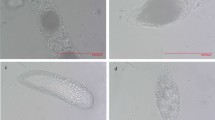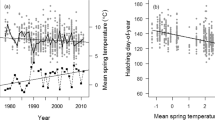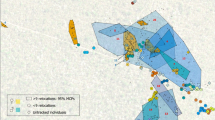Abstract
IN all major groups of Crustacea except in cirripedes it is well known that breeding is closely bound up with the moulting cycle. First, the male generally copulates with a female which has just moulted. Secondly, the moulting cycle is often interrupted while the eggs are being carried so that eggs are not lost by the shedding of the cuticle to which they are attached.
This is a preview of subscription content, access via your institution
Access options
Subscribe to this journal
Receive 51 print issues and online access
$199.00 per year
only $3.90 per issue
Buy this article
- Purchase on Springer Link
- Instant access to full article PDF
Prices may be subject to local taxes which are calculated during checkout
Similar content being viewed by others
References
Crisp, D. J., Nature, 178, 263 (1956).
Crisp, D. J., J. Mar. Biol. Assoc. U.K., 33, 473 (1954).
Barnes, H., and Barnes, M., Arch. Soc. Zool. Bot. Fenn. Vanamo, 11, 11 (1956).
Frohawk, E. W., “Natural History of Butterflies” (Hutchinson, London, 1924).
Author information
Authors and Affiliations
Rights and permissions
About this article
Cite this article
CRISP, D., PATEL, B. Relation between Breeding and Ecdysis in Cirripedes. Nature 181, 1078–1079 (1958). https://doi.org/10.1038/1811078b0
Issue Date:
DOI: https://doi.org/10.1038/1811078b0
This article is cited by
-
Living on the edge: reproductive cycle of a boreal barnacle at its southernmost distribution limit
Marine Biology (2021)
-
Effects of crowding and wave exposure on penis morphology of the acorn barnacle, Semibalanus balanoides
Marine Biology (2010)
-
Natural cyclic degeneration by a sequence of programmed cell death modes in Semibalanus balanoides (Linnaeus, 1767) (Crustacea, Cirripedia Thoracica)
Zoomorphology (2008)
-
Breeding and moulting of barnacles under rearing conditions
Marine Biology (1991)
Comments
By submitting a comment you agree to abide by our Terms and Community Guidelines. If you find something abusive or that does not comply with our terms or guidelines please flag it as inappropriate.



